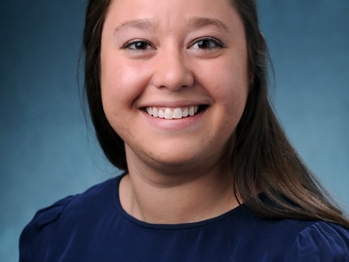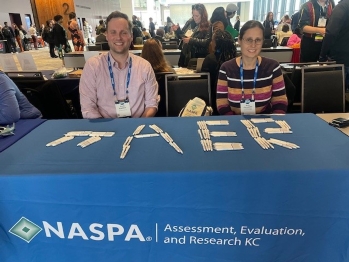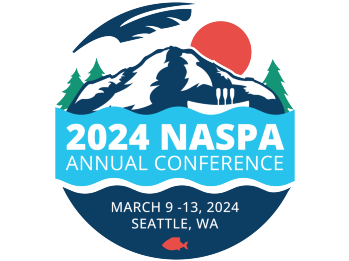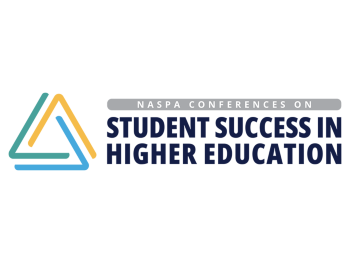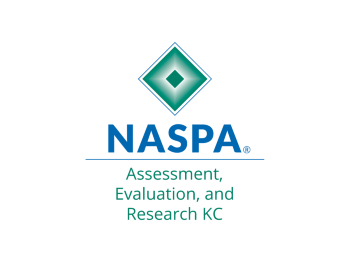
Assessment, Evaluation, and Research
Assessment, Evaluation, and Research
The NASPA Assessment, Evaluation, and Research (AER) Knowledge Community encourages and supports student affairs professionals as they assess learning, evaluate programs, and conduct research. By providing quality education and networking opportunities, the KC promotes continuous improvement and AER best practices within Student Affairs.
Message from the Co-Chairs
Welcome to the NASPA Assessment, Evaluation, and Research Knowledge Community (AERKC)! This area of student affairs has grown tremendously over the past few years and continues to be a professional development priority for NASPA through this KC and the Professional Standards Division. We hope that you will engage in the profession, the association, and the KC to enhance your skills as a practitioner!
About
The NASPA Assessment, Evaluation and Research Knowledge Community will:
- provide education for members on assessment, evaluation and research through a variety of cost efficient methods.
- strive to create and share new and innovative ways of assessing our work.
- provide support and networking opportunities to all members and specifically full time assessment professionals.
- assist campuses to move forward in the assessment of student affairs by providing short term assessment consulting at conferences.
- remain committed to researching and responding to data regarding our member needs and skills.
- be available and visible at national and regional conferences.
The AERKC also encourages constituents to be familiar with and apply NASPA’s professional competencies and applicable rubrics. Professionals should use the frameworks to select appropriate professional development opportunities in order to increase skills and knowledge.
Professional Competencies:https://www.naspa.org/images/uploads/main/ACPA_NASPA_Professional_Competencies_FINAL.pdf
Professional Competency Rubrics:
https://www.naspa.org/images/uploads/main/ACPA_NASPA_Professional_Competency_Rubrics_Full.pdf
Complete Your Profile
Login and update your profile.
Leadership Team
Knowledge Community leaders are NASPA volunteers who have generously devoted their time to their Knowledge Community. Chairs are elected by the Knowledge Community members while Regional representatives are selected from within the Region. Additional roles are selected by the Knowledge Community.
Recent Blogs
Events
One of the best resources available to you is the wide range of professional development opportunities. This list contains both our “Hosted Events,” workshops and webinars that we plan and manage, and some “Related Events,” hosted by the NASPA Central Office or other NASPA Constituent Groups. To see a full listing of NASPA events, please see the Events page.
Awards
Submit a nomination for the Assessment, Evaluation, and Research Knowledge Community Awards. Recognizing our members for their accomplishments is an important part of the AERKC's mission and we need members like you to help us recognize deserving individuals!
2025 NASPA AER KC Awards
Apply in NASPA Awards Portal by October 9, 2024 [https://naspa.secure-platform.com/awards/]
Excellence in Education Award
This award recognizes innovative practice and recognition of notable education efforts/experiences within the NASPA Assessment, Evaluation & Research community. Recipients are recognized at the NASPA Annual Conference; this is not a monetary award.
Excellence in Publication Award
This award recognizes excellence in publication related to Student Affairs assessment, evaluation, or research. Recipients are recognized at the NASPA Annual Conference. Recipients are recognized at the NASPA Annual Conference; this is not a monetary award.
Promising Practice Grant
This award incentivizes the planning and execution of thoughtfully constructed, equity-centered higher education/student affairs assessment and evaluation projects that are shared with the larger NASPA community. The grant is intended to recognize promising learning outcomes assessment practices in the classroom or co-curricular space to be conducted in the short-term future. This grant is not intended to support empirical research projects (that is, the grant should not be used to test or develop theory). The grant will support the dissemination of the project at the NASPA Annual Conference or NASPA Conferences on Student Success in Higher Education (SSHE).
2025 Graduate Student AER KC Awards
Graduate Student Travel Award
This award covers up to $250 in travel expenses to attend the NASPA Conferences on Student Success in Higher Education. Not available for application through NASPA portal; send requests for this award by emailing Dr. Erica Eckert (eeckert@kent.edu) and Dr. D’Arcy Oaks (oaks.9@osu.edu). In your request, please 1) indicate the degree, program, and institution of your enrollment, 2) what other funding sources you have pursued within or outside your institution, and 3) describe how attending this conference will contribute to your overall professional development. Funds subject to availability.
Graduate Student Board Service Award
This award is open to graduate student board members of the AER KC and covers up to $250 in travel expenses to attend the NASPA Conferences on Student Success in Higher Education. Not available for application through NASPA portal; send requests for this award by emailing Dr. Erica Eckert (eeckert@kent.edu) and Dr. D’Arcy Oaks (oaks.9@osu.edu). In your request, please 1) indicate the degree, program, and institution of your enrollment, 2) what other funding sources you have pursued within or outside your institution, and 3) describe how attending this conference will contribute to your overall professional development. Funds subject to availability.
Newsletter
AER Newsletter Archive
Below you can find an archive of all of the AER KC Newsletters dating back to February 2010.
Get Connected
Assessment, Persistence, and Data Analytics Conference
NASPA annually holds an annual conference designed to promote student learning and success by strengthening assessment, improving educational quality, and developing intentional persistence programming. The AERKC sponsors programs and encourages attendance. Visit the most current conference site for details. Check back later this year for information about the 2020 APDA Conference.
Stay Connected via Social Media
Check out our Facebook, Twitter and LinkedIn to stay up to date on what is happening in the AER community.
Blog
AER will be utilizing our blog to start conversations amoung colleagues. We encourage you to make comments, submit questions, and keep the conversation going. We look forward to keeping aassessment, evaluation, and research at the forefront of your thoughts!
We encourage you to submit articles of research or conversation starters to our AER Communications Chair, Melissa Kisubika at kisubika@illinois.edu. You could see your topic or article in our blog soon!
Volunteer Central
We are always looking for people to get involved in the AERKC and on various sub-committees and workgroups. We routinely post information on the main volunteer site for NASPA. Please visit Volunteer Central to see available opportunities and chances to network with AER colleagues from across NASPA. To learn more about all NASPA volunteer opportunities go to https://www.naspa.org/about/get-involved/volunteer
Resources
AER KC Competentices Professional Development Resource Guide
The Professional Development Subcommittee to the NASPA Knowledge Community for Assessment, Evaluation, and Research has developed resource list linked to the NASPA/ACPA AER Professional Competencies, see the PDF found here - Competency Resource Guide.
AER KC Stratetic Plan
The Assessment, Evaluation, and Research Knowledge Community has developed a strategic plan for the KC. For more information on the roadmap created to guide the AER KC see the PDF found here - http://apps.naspa.org/files/NASPA_AERKC_StrategicPlan2017.pdf
If you would like to recommend resources to be shared on this page please contact Kim Kruchen.
Past NASPA Annual Conference Sponsored Programs
Coming Soon
2015
| Program Title | Coordinating Presenter | Powerpoint/Other Resources |
|---|---|---|
| The integrated student: Advancing practice and research on student learning in student affairs | Amy Homkes-Hayes | |
| Courageous Collaboration: Team-Based Approaches to Strategic Planning for Student Success | Todd Chamberlin |
|
Recommended Reading and Articles
Resources listed below are in Alphabetical order. If you have additional resources you believe would fit this section see the bottom of this page for contact information
- ACPA. (2007). ASK standards: Assessment skills and knowledge content standards for student affairs practitioners and scholars. Washington, DC: Author.
- ACPA, & NASPA. (2010). Professional competency areas for student affairs practitioners. Washington, DC: Author.Allen, K. R., Elkins, B., Henning, G. W., Bayless, L. A., &Gordon, T. W. (2013). Accreditation and the role of the student affairs professional. Washington, DC: ACPA-College Student Educators International. Available fromhttp://www2.myacpa.org/publications
- American College Personnel Association (ACPA). (2007).ASK standards: Assessment skills and knowledge content standards for student affairs practitioners and scholars.Washington, D. C.: Author.
- Angelo, T. & Cross, K. (1993). Class assessment techniques: A handbook for college teachers. San Francisco: Jossey-Bass.
- Anderson, L. W., & Krathwohl, D. R. (2001). A taxonomy for learning, teaching and assessing: A revision of Bloom’s Taxonomy of educational objectives, abridged edition. Boston, MA: Allyn and Bacon.
- Banta, T. W., Lund, J. P., Black, K. E., Oblander, F. W. (Eds.) (1996). Assessment in practice: Putting principles to work on college campuses. San Francisco: Jossey-Bass.
-
Biddix, J. P. (2018). Research methods and applications for student affairs. San Francisco, CA: Jossey Bass.
-
Bingham, R. P., Bureau, D., Duncan, A. G., & Ludvik, M. J. (Eds.). (2015). Leading assessment for student success: ten tenets that change. Place of publication not identified: Stylus Publishing.
- Bloom, B. S. (1968). Learning for mastery. UCLA: Center for the study of evaluation of instructional programs, (1)2. Los Angeles, CA.
- Bresciani, M. J., Zelna, C. L., and Anderson, J. A. (2004).Assessing student learning and development: A handbook for practitioners. Washington, D.C.: National Association of Student Personnel Administrators.
- Bresciani, M. J., Moore Gardner, M., Hickmott, J. (2010).Demonstrating Student success: A practical guide to outcomes-based assessment of learning and development in student affairs. Sterling, VA: Stylus.
- Bresciani, M. J. (2011, August). Making assessment meaningful: What new student affairs professionals and those new to assessment need to know (NILOA Assessment Brief: Student Affairs). Urbana, IL: University for Illinois and Indiana University, National Institute for Learning Outcomes Assessment.
- Collins, K. M., & Roberts, D. M. (Eds.). (2012). Learning is not a sprint: Assessing and documenting student leader learning in cocurricular involvement. Washington, DC: NASPA.
- Council for the Advancement of Standards in Higher Education. Professional standards in higher education (August, 2012). 8th Ed. Washington, D.C.: Author.
- Council for the Advancement of Standards in Higher Education (2006). Frameworks for assessing learning and development outcomes. Washington, D.C.: Author.
- Culp, M. M. & Dungy, G. J. (Eds.). (2012). Building a culture of evidence in student affairs: A guide for leaders and practitioners. Washington, D.C.: National Association of Student Personnel Administrators.
- Dillman, D. A., Smyth, J. D., & Christian, L., M. (2014). Internet, phone, mail, and mixed-mode surveys: The tailored design method (4th ed.). Hoboken, NJ: Wiley.
- Evergreen, S. D. H. (2014). Presenting data effectively: Communicating your findings for maximum impact. Los Angeles, CA: Sage.
- Ewell, P. T. (2009, November). Assessment, accountability, and improvement: Revisiting the tension(NILOA Occasional Paper No.1). Urbana, IL: University of Illinois and Indiana University, National Institute for Learning Outcomes Assessment.
- Heinich, R., Molenda, M., Russell, J., & Smaldino, S. (2002). Instructional Media and Technologies for Learning (7th ed.). Englewood Cliffs, NJ: Prentice Hall.
- Henning, G. W., & Roberts, D. (2016). Student affairs assessment: Theory to practice. Sterling, VA: Stylus.
- Kaufman, R., & Guerra-Lopez, I. (2013). Needs assessment for organizational success.Alexandria, VA: ASTD Press.
- Keeling, R. (Ed.). (2004). Learning reconsidered. A campus-wide focus on the student experience. Washington, D.C.: National Association of Student Personnel Administrators & American College Personnel Association.
- Keeling, R. P (Ed). (2006). Learning reconsidered 2: A practical guide to implementing a campus-wide focus on the student experience. Washington, D.C.: American College Personnel Association, Association of College and Housing Officers—International, Association of College Unions—International, National Academic Advising Association, National Association of Campus Activities, National Association of Student Personnel Administrators, & National Intramural—Recreational Sports Association.
- Keeling, R. P., Wall, A. F., Underhile, R., and Dungy, G. J. (2008). Assessment reconsidered. Washington, D. C.: International Center for Student Success and Institutional Accountability.
- Keller, D. K. (2006). The tao of statistics: A path of understanding (with no math). Thousand Oaks, CA: Sage Publications.
- Kennedy-Phillips, L., Baldasare, A., & Christakis, M. N. (2015). Measuring cocurricular learning: the role of the IR office. San Francisco: Jossey-Bass.
- Kranzler, J. H. (2006). Statistics for the terrified (4th ed.). Upper Saddle River, NJ: Prentice Hall.
- Krueger, R. A., & Casey, M. A. (2015). Focus groups: A practical guide for applied research. Los Angeles, CA: Sage.
- Lindsay, N. (2011). Learning to measure the difference we make: Affordable options for professional development. NASPA Knowledge Communities: Celebrating Ten Years of Educating for Lives of Purpose: 6-7.
- Maki, P. L. (2004). Assessing for learning: Building a sustainable commitment across the institution. Sterling, VA: Stylus.
- Miller, M. A. (2012, January). From denial to acceptance: The stages of assessment (NILOA Occasional Paper No.13). Urbana, IL: University of Illinois and Indiana University, National Institute for Learning Outcomes Assessment.
- Palomba, Catherine A., & Banta, Trudy W. (1999).Assessment essentials: Planning, implementing, improving. San Francisco: Jossey-Bass.
- Pascarella, E. T., & Terenzini, P. T. (2005). How college affects students: A third decade of research. San Francisco: Jossey-Bass.
- Phillips Bingham, R., Bureau, D. A., & Garrison Duncan, A. (Eds.). (2015). Leading assessment for student success: Ten tenets that change culture and practice in student affairs. Sterling, VA: Stylus.
- Pulliam Phillps, P., Phillips, J. J., & Aaron, B. (2013). Survey basics. Alexandria, VA: ASTD Press.
- Roberts, D. M., & Bailey, K. J. (Eds.). (2016). New Directions in Student Leadership: No. 151. Assessing student leadership. San Francisco, CA: Jossey-Bass.
- Schuh, J. H., Biddix, J. P., Dean, L. A., & Kinzie, J. (Eds.). (2016). Assessment in student affairs (2nd ed.). San Francisco, CA: Jossey-Bass.
- Schuh, J. M., Upcraft, M. L. and Associates.(2001).Assessment practice in student affairs: An applications manual. San Francisco: Jossey-Bass.
- Schuh, J. M., & Associates (200). Assessment methods for student affairs. San Francisco: Jossey-Bass.
- Schuh, J. H., & Gansemer-Topf, A. M. (2010, December).The role of student affairs in student learning assessment(NILOA Occasional Paper No.7). Urbana, IL: University of Illinois and Indiana University, National Institute for Learning Outcomes Assessment.
- Schuh, J. (Ed.) (2013, Summer). Selected contemporary issues in assessment. (J. Schuh, Ed.) New Directions in Student Services 2013(142).
- Sriram, R. (2014). Five things not to do in developing surveys for assessment in student affairs. Washington, DC: NASPA.
- Sriram, R. (2017). Student affairs by the numbers: Quantitative research and statistics for professionals. Sterling, VA: Stylus.
- Stevens, D. D., & Levi, A. J. (2013). Introduction to rubrics: An assessment tool to save grading time, convey effective feedback, and promote student learning (2nd ed.). Sterling, VA: Stylus.
- Suskie, L. A. (2009). Assessing student learning: A common sense guide (2nd Ed). San Francisco: Jossey-Bass.
- Timm. D. M., Davis Barham. J., McKinney, J., & Knerr, A. R. (2013). Assessment in practice: A companion guide to the ASK standards. Washington, DC: ACPA-College Student Educators International. Available from http://www2.myacpa.org/publications
- Tull, A., & Kuk, L (Eds.). (2012). New realities in the management of student affairs: Emerging specialist roles and structures for changing times. Sterling, VA: Stylus.
- United Nations Economic Commission for Europe. (2009). Making data meaningful, Part 1: A guide to writing stories about numbers. New York, NY: United Nations.
- United Nations Economic Commission for Europe. (2009). Making data meaningful, Part 2: A guide to presenting statistics. Geneva, Switzerland: United Nations.
- United Nations Economic Commission for Europe. (2011). Making data meaningful, Part 3: A guide to communicating with the media. Geneva, Switzerland: United Nations.
- United Nations Economic Commission for Europe. (2012). Making data meaningful, Part 4: A guide to improving statistical literacy. Geneva, Switzerland: United Nations.
- Upcraft, M.L and Schuh, J.H. (1996). Assessment in student affairs: a guide for practitioners. San Francisco: Jossey-Bass.
- Urdan, T. (2001). Statistics in plain English. Mahwah, N.J.: Lawrence Erlbaum Association.
- Walvoord, B.E. (2004). Assessment clear and simple: A practical guide for institutions, departments, and general education. San Francisco: Jossey-Bass.
- Yancey Gulley, N., Dean, S. R., & Dean, L. A. (Eds.). (2017). Using the CAS Professional Standards: Diverse examples of practice. Washington, DC: NASPA, ACPA, and CAS.
- Yousey-Elsener, Bentrim, E., & Henning, G. W. (Eds.). (2015). Coordinating student affairs divisional assessment: A practical guide. Sterling, VA: Stylus.
Web Resources
- Assessment Commons: Internet Resources for Higher Education Outcomes Assessment: http://assessmentcommons.org/
- Association for Higher Education Effectiveness - http://www.ahee.org
- Association for Institutional Research: http://www.airweb.org/pages/default.aspx
- Association for the Assessment of Learning in Higher Education - http://aalhe.org
- Council for the Advancement of Standards in Higher Education - www.cas.edu
- Internet Resources for Higher Education Outcomes Assessment - http://www2.acs.ncsu.edu/UPA/archives/assmt/resource.htm
- Journal of Assessment and Institutional Effectiveness: http://www.psupress.org/journals/jnls_jaie.html
-
Journal of Student Affairs Inquiry: https://jsai.scholasticahq.com/
- National Institute for Learning Outcomes Assessment - http://www.learningoutcomeassessment.org
- Student Affairs Assessment Leaders - http://studentaffairsassessment.org
-
Research & Practice in Assessment: http://www.rpajournal.com/
Student Affairs Assessment Websites
- California State University, Stanislaus
- Christopher Newport University
- Dartmouth College
- Florida State University
- Louisiana State University
- North Carolina State University
- New York University
- NOVA Southeastern University
- Oklahoma State University
- Oregon State University
- Portland State University
- Syracuse University
- Texas A&M University
- The Ohio State University
- University of Alabama
- University of Alaska Anchorage
- University of Albany
- University of Arizona
- University of California, Berkeley
- University of California, San Diego
- University of Central Florida
- University of Georgia
- University of La Verne
- University of Michigan
- University of Minnesota
- University of North Carolina at Charlotte
- University of North Carolina at Greensboro
- University of North Carolina at Wilmington
- University of Texas at San Antonio
- University of Utah
- University of Vermont
- University of Washington
Interested in having your Student Affairs Assessment Website posted on this page? ContactDarby Roberts or Ryan Keytack
Additional NASPA Resources
- NASPA Online Learning Community: Explore hundreds of online courses from NASPA’s initiatives, programs, and events.
- Assessment and Persistence Conference Archives: Login to the NASPA archives with your password and search past national events for all of the uploaded presentations, presenter contacts and more.

